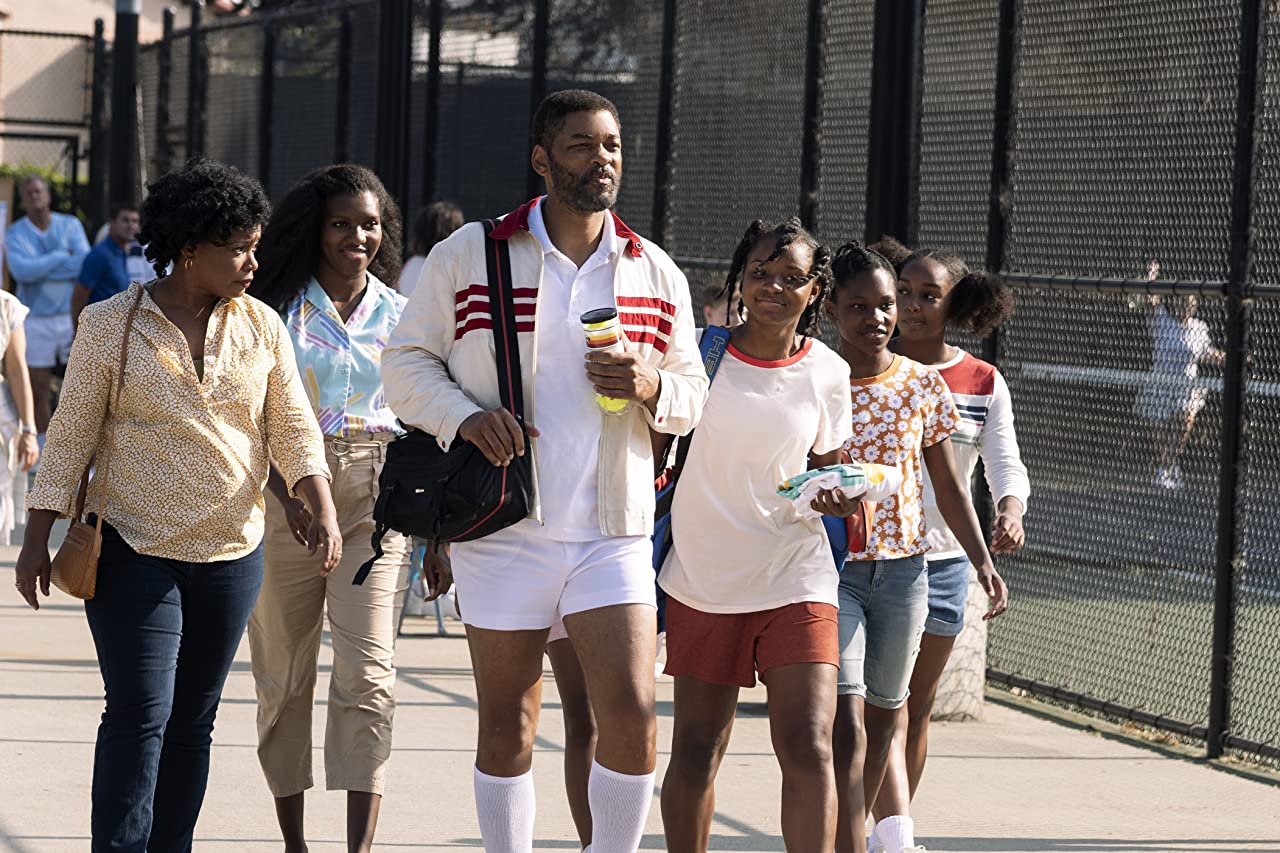King Richard (2021): A Movie Review
An inspiring biopic of the Williams sisters' journey from Compton to pro tennis under the controlling tutelege of their father.

A handful of times a year, movies I don't have big expectations of blow me away. The element of surprise makes these some of my most memorable cinema trips - ones that immerse and engage when I wasn't expecting.
These movies, as much as ones I anticipate and do live up to expectations, make going to the cinema often, and seeing films I don't know much about going in, so rewarding. The "you don't know what you'll get" factor.
Pablo Larraín’s unconventional biopic of Princess Diana, Spencer (2021), fit the bill. King Richard, directed by Reinaldo Marcus Green (Monsters and Men (2018)), is the latest to do so.
The movie tells the story of tennis greats Venus and Serena Williams. It follows their journey from Compton, through junior competitions, and finally becoming pro under the controlling tutelage of their father, Richard Williams. Richard has mapped out that journey in detail with a relentless schedule and life-dominating plan he made before their birth.
There are plenty of tennis sequences, but this doesn’t play like a tennis or sports movie. It is a biopic more concerned with the struggle of surviving and escaping the poverty of the ghetto, and the extreme sacrifices and risks required to pursue that path and stay on it.
The feeling generated by the movie is one of drive, purpose, and a resolute determination to push through adversity. To win games rigged against you. It never makes things saccharine, and it would be a misnomer to call it a “feel good” movie, but the story has an uplifting energy. It is motivational, thoughtful, and skilful in how it delivers social commentary on racism in the US, class divisions, the physical violence of the ghetto, and the ugly abuses of the upper class.
The tennis sequences are put together well: they are fast-paced, well edited, and have an emotional and narrative purpose. I don’t follow tennis closely, but the sport captures my attention when I watch it. It has a singular mix of mental and physical competition, and more than other sports it feels as much a battle of minds, mental toughness, quick-thinking, and drive, as anything athletic.
As an aside, I credit my appreciation of tennis to two things: Virtua Tennis, which I played endlessly growing up and never stopped being fun; and, the writing of David Foster Wallace, who played tennis at a high competitive level and wrote amazingly on the sport (I beseech you to check out Roger Federer as Religious Experience if you haven’t read it).
While the tennis sequences aren’t the core of the movie, their execution is good, and I enjoyed them. The narrative focus drops once or twice in places with longer tennis sequences, but it always swings back around to the real, human heart of things.
The film looks great. It contrasts urban shots of poverty-stricken Compton in warm browns and oranges against the affluent world of elite tennis coaching facilities, which have naturally cold hues, greens and blues, and a more clinical style.
Performances are excellent. Saniyya Sidney (Venus Williams) and Demi Singleton (Serena Williams) play the Williams sisters with innate strength, a high capacity to absord and learn, and the vulnerability of teenage years. Venus is the more self-assured of the two. Her challenge is to stay humble and win with grace after she starts rolling through the local competition. Serena is scrappier, but with more uncertainty and frustration to manage as she takes the harder path to achieving her goals. Battles of self-confidence and doubt underpin both sisters (and are mirrored in Richard). The story shows how their characters were forged in the fires of two environments, extreme in different ways.
Aunjanue Ellis plays their mother, Oracene Williams, giving an understated performance with impact. Oracene is quiet and strong, observes, stays silent most of the time, but intervenes when she needs to. She is an expert at confronting without provoking fruitless escalation, and delivering harsh truths underscored with footnotes of love or at least togetherness — enough to make the medicine go down.
Oracene takes on a critical role in Serena’s tennis life when she is in danger of being left behind. She is a mother who endures hardship without complaint while raising five daughters (Serena and Venus have three siblings, who also play notable roles in the story).
Will Smith plays Richard Williams as a complex characterisation. Outspoken but humble, understated but uncompromising, damaged but someone who “keeps his heart clean,” hyper-controlling but with purpose. It is a performance that ranks with the best of Smith’s career. The role is made for him, and it is interesting seeing him play it older than age.
Richard is uncompromising and nonconfirmist, projecting anti-establishment strength. He carries scars and resentments. The movie does not reduce him to either a heroic father or an overbearing monster, but reveals him as a complex human being at battle to maintain balance of strengths and flaws while achieving his goals. It leaves the viewer to sum him up.
When Richard sees an interviewer press Venus on an issue, mining for self-doubt, he intervenes without hesitation, ignoring the rolling TV cameras and professional context. He attacks the interviewer, pointing out that he is dealing with a child and has no right to treat her confidence as something to be attacked. It is a key moment that reveals Richard’s strength as a protective force in any environment.
Social commentary on life in Compton is handled with skill. A neighbour whose daughter was swept up into prostitution is shown to be damaged and bitter, but not truly at fault. Allowing a child simple freedoms to interact with their environment is enough to ruin them. The controlling schedule Richard imposes on Venus and Serena, to his neighbour’s resentment, is not without reason.
Gang members often attack Richard when he ventures out to the local tennis courts. In the most extreme example, Richard snaps and seeks retaliation. No spoilers, but the sequence deftly suggests that the hyper-aggressive and violent behaviour of the gang member is a posture of fear, adopted in response to living under extreme physical threat. It also shows, the nonviolent Williams with gun in hand, how anyone can be swept into street violence in this environment. The message is unspoken, but well communicated.
King Richard is a compelling tennis biopic. The tennis sequences, photography, acting, and script are all excellent — with a few minor pacing issues. It is driven by a bright and engaging energy that makes astute social commentary by contrasting two opposing worlds. A well-rounded and motivational movie that hits the mark.
James Lanternman writes movie reviews, essays, and moonlit thoughts. You can reach him at [email protected].
Previously… Belfast (2021): A Movie Review
